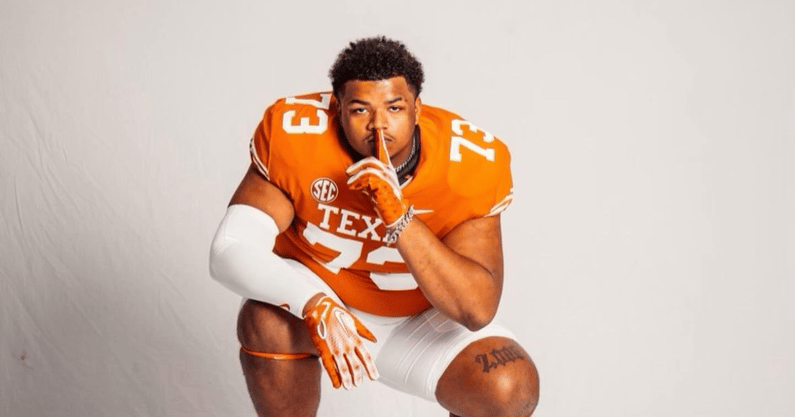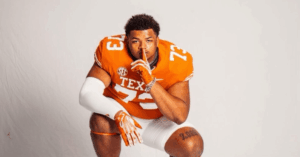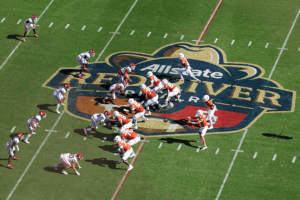
Nick Brooks of the Texas Longhorns Acknowledges “Exceptions” Made for UT Players Prior to His DWI Arrest
In the world of collegiate sports, the line between success on the field and personal behavior off it is often a thin one. Fans and the media alike tend to focus on victories, championships, and star players, sometimes overlooking the personal lives and actions of athletes that may have broader implications for their careers and the programs they represent. In recent months, an incident involving Nick Brooks, a player for the Texas Longhorns football team, has brought attention to the issue of how universities handle player discipline, particularly when it involves serious legal matters such as driving while intoxicated (DWI).
Brooks, who had been a rising star on the Longhorns’ roster, found himself in hot water following his arrest for a DWI. However, the situation became even more complicated when he publicly acknowledged that the University of Texas had made “exceptions” for players, including himself, in the past, seemingly allowing certain transgressions to go unchecked or dealt with more leniently than one might expect from an academic institution of its stature.
This revelation raised serious questions about the way universities, athletic programs, and coaches approach discipline, as well as the broader culture that exists in college sports where star athletes are sometimes afforded special treatment that could undermine the integrity of the system. In this article, we will explore the events leading up to Brooks’ arrest, the implications of his acknowledgment of “exceptions,” and the broader conversation about how college programs should balance athletic success with personal accountability.
The Rise of Nick Brooks at the University of Texas
Nick Brooks was a standout player for the Texas Longhorns football team. A defensive lineman with raw talent and a promising future, Brooks quickly gained the attention of fans, coaches, and recruiters alike. His ability to disrupt opposing offenses and make key tackles made him a valuable asset to the team. As is the case with many talented college athletes, Brooks quickly became one of the focal points of Texas’ defense, contributing to the team’s overall success and generating excitement for the future.
However, the nature of college sports is that the pressure to succeed is immense. While players like Brooks may receive immense attention and acclaim for their athletic performances, the stakes of their college careers are higher than most can imagine. The demands on their time, energy, and focus are intense, and the mental and emotional toll can be overwhelming. Add to that the distractions of college life, social pressures, and the temptation to engage in risky behavior, and it becomes clear that many college athletes are balancing precariously on a tightrope between their athletic futures and their personal choices.
The DWI Arrest and its Aftermath
The tipping point in Nick Brooks’ career came when he was arrested for driving while intoxicated (DWI) after a night out. The details of the arrest were widely reported, and the incident quickly became a subject of media scrutiny. Brooks was pulled over by law enforcement after failing a sobriety test, and his arrest was part of a larger pattern of concerning behavior that had surfaced in the Texas athletic program.
In a statement released shortly after the arrest, Brooks expressed regret for his actions and took full responsibility for the mistake. The Texas Longhorns football program, under the guidance of head coach Steve Sarkisian, issued a brief statement addressing the incident, noting that Brooks would face disciplinary actions in accordance with team policies. At first glance, this seemed like a routine response to an unfortunate situation, but it wasn’t long before Brooks’ comments in an interview began to stir up controversy.
The “Exceptions” Acknowledgement
In a candid interview with a local sports network, Brooks acknowledged that prior to his arrest, there had been several instances in which the University of Texas and its athletic department had made “exceptions” for certain players, including him. He admitted that he, along with some of his teammates, had been involved in past incidents that could have resulted in more severe consequences but had instead been met with leniency from the university.
Brooks’ comments created an immediate firestorm of criticism. His acknowledgment of “exceptions” raised significant questions about the university’s approach to discipline. How many other players had been afforded similar treatment? What kind of message was being sent to other students at the university who may not have the same status as a high-profile athlete? More importantly, did this culture of leniency perpetuate a system in which elite athletes were allowed to evade the consequences of their actions simply because of their ability to perform on the field?
Brooks’ admission shed light on what many critics saw as a broader issue within the athletic program: a tendency to prioritize the success of the team over the personal accountability of its players. The notion that certain behaviors might be overlooked or handled with less severity for the sake of maintaining a winning program raised serious ethical concerns.
The Role of Coaches and the Athletic Department
One of the most critical aspects of this issue is the role of coaches and the athletic department in shaping the culture within their programs. The head coach, in particular, holds significant responsibility for setting the tone and ensuring that players are held to high standards both on and off the field. In the case of the Texas Longhorns, Coach Steve Sarkisian faced tough questions about whether his program had been too lenient in handling incidents of misconduct by players in the past.
Sarkisian, known for his emphasis on discipline and leadership, found himself under fire for allowing a culture of “exceptions” to take root within the team. While Sarkisian was quick to express disappointment in Brooks’ actions, critics questioned whether the coach had done enough to instill a sense of personal responsibility in his players.
Furthermore, the broader athletic department faced scrutiny for its role in handling player discipline. The University of Texas, as one of the largest and most prestigious programs in collegiate athletics, is held to a high standard of accountability. The question became whether the school was willing to make tough decisions in order to protect the integrity of its athletic program, or whether it was more concerned with maintaining the success of its football team at any cost.
The Broader College Sports Culture
Nick Brooks’ situation, though highly publicized, is not an isolated incident. Across the country, many top-tier athletic programs have faced similar challenges in balancing athletic success with the personal accountability of their players. There are countless instances in which college athletes have been involved in legal issues, ranging from minor offenses to more serious crimes, yet have been allowed to continue playing, sometimes with little more than a slap on the wrist.
The culture of college sports, particularly in programs with large followings and media attention, often creates a situation where athletes are treated differently from the general student body. The lure of victory and the commercial value that college football, basketball, and other sports generate for universities can sometimes overshadow the importance of holding athletes accountable for their actions. This dynamic has led to concerns about fairness and the potential for athletes to feel entitled or invincible, insulated from the consequences of their actions by their status as star players.
The pressure on players to succeed and maintain their position on the team can also contribute to a sense of entitlement. Athletes may feel that they are above the rules, especially if they have been rewarded with special privileges in the past. In some cases, the atmosphere within the locker room or team meetings may even foster an unhealthy sense of competition and rivalry, where personal behavior takes a back seat to team success.
Reforming the System
In light of incidents like Nick Brooks’ arrest and the broader conversation about player discipline in college sports, many have called for reforms to ensure that athletes are held accountable for their actions, regardless of their standing on the team. Advocates for change argue that universities and athletic programs should implement clearer and more consistent policies for dealing with player misconduct. These policies should prioritize personal responsibility, ensuring that all students—athletes and non-athletes alike—are held to the same standards.
Furthermore, there are calls for increased transparency in how these disciplinary decisions are made. Colleges and universities should be more forthcoming about the actions taken when athletes break the law or violate team policies. This transparency would not only help restore public trust but also send a clear message that no one, regardless of their athletic ability, is above the rules.
Nick Brooks’ acknowledgment of “exceptions” made by the University of Texas for players prior to his DWI arrest has sparked an important conversation about the balance between athletic success and personal responsibility in collegiate sports. While his revelation is troubling, it also presents an opportunity for change and reform within the system. As universities, athletic departments, and coaches grapple with how to handle player misconduct, the goal should be to create an environment where athletes are held accountable for their actions, where success on the field does not come at the cost of personal integrity, and where the values of discipline, respect, and responsibility are instilled in athletes from the very beginning.
As the story of Nick Brooks continues to unfold, it serves as a reminder that the pressures of collegiate athletics should never overshadow the need for athletes to grow as responsible individuals, capable of making positive contributions both on and off the field. The ultimate test of any university program is not just how many championships it can win, but how it prepares its athletes to succeed in all areas of life.
This piece touches on various facets of the situation, expanding on the story of Nick Brooks, the context of collegiate sports, and the potential changes needed within university athletic programs. Would you like to dive deeper into any particular section or aspect of the story?





